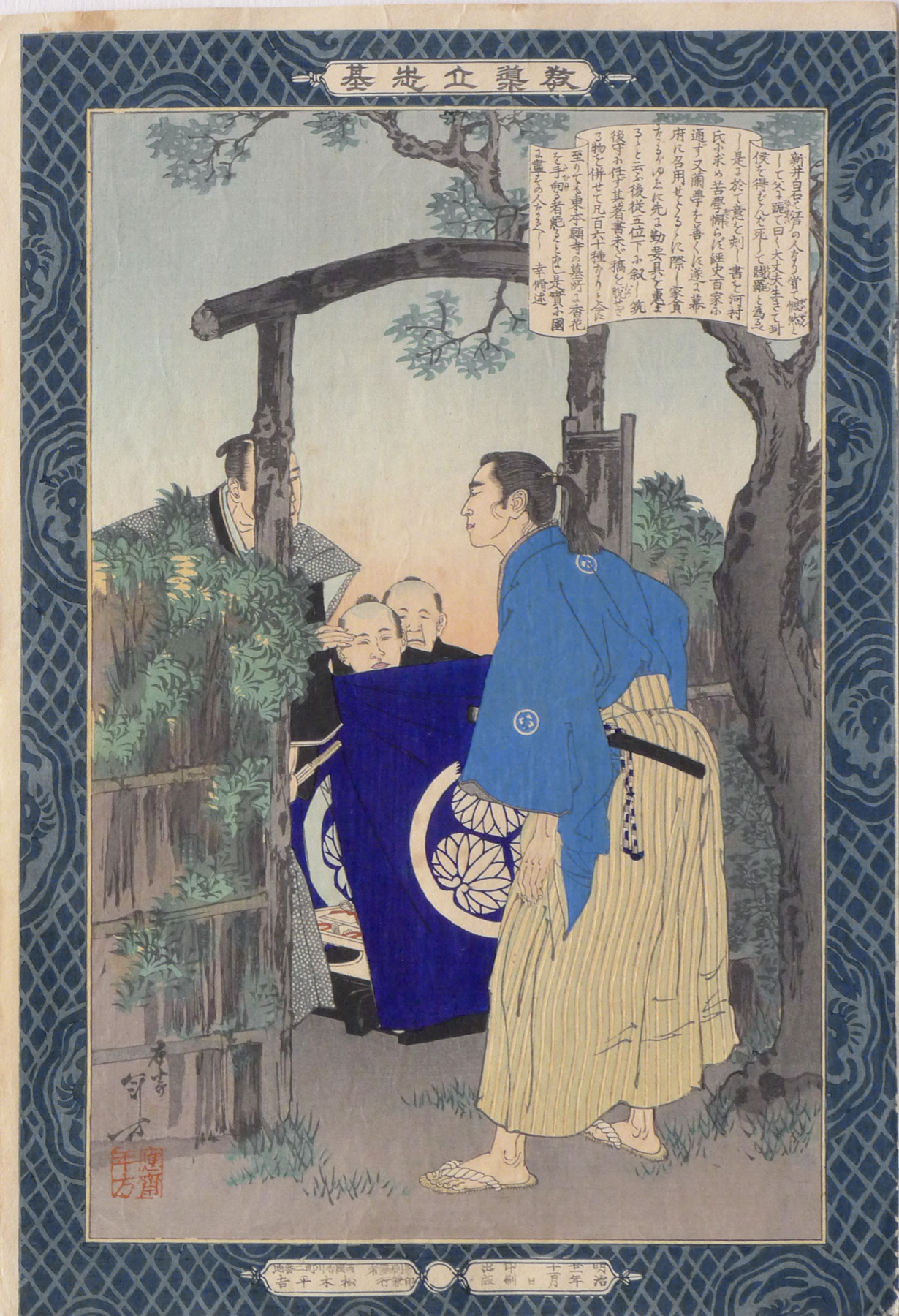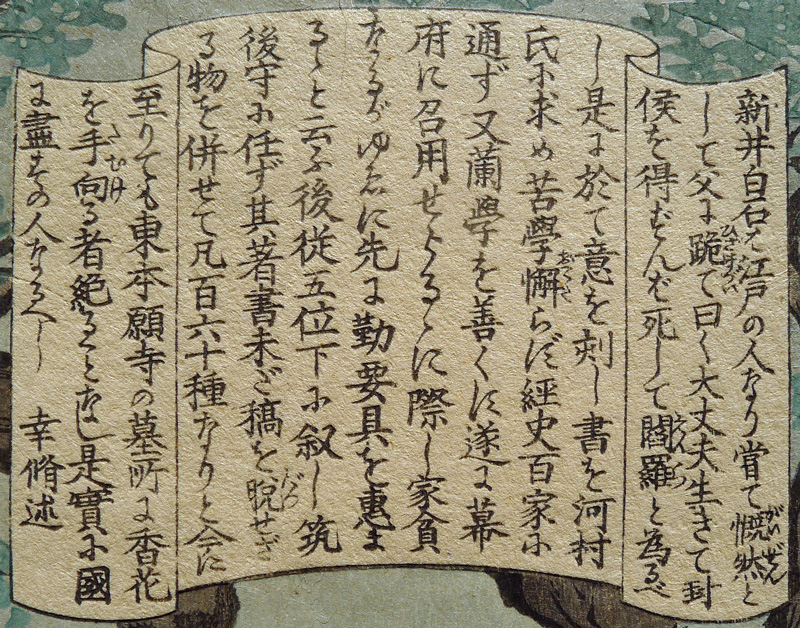About This Print
Print number 四十三 [43]1 from the series Instructive Models of Lofty Ambition picturing the 17th century Confucian scholar Arai Hakuseki (1657-1725) receiving the Tokugawa shogun's representatives.The artist Mizuno Toshikata contributed 16 prints to this series.
1 Numbering of the prints was haphazard during the production of the series. While this print is unnumbered, the title for this print is shown in the 43rd position listed in the Table of Contents for this series (reference Table of Contents from the series Instructive Models of Lofty Ambition) and other impressions of this print do show the print number 43. Print numbers were sometimes inadvertently omitted; some prints in the series were never assigned numbers and a few of the same numbers appear on different prints.
About Arai Hakuseki
Arai Hakuseki (1657-1725), born into a minor and poor samurai family, was to go on and become one of Japan's greatest Confucian scholars. As the personal adviser to the sixth Tokugawa shogun, Ienobu, and Ienobu's successor Ietsugu, he exerted considerable influence over bakufu policy. Along with instituting currency and legal reforms, he was a proponent of enhancing the status of the shogun as the national ruler.In 1708 when the Italian missionary Father Sidotti was arrested for attempting to preach Christianity in Japan, he was sent to Edo where he was interviewed by Hakuseki, which resulted in the first written Japanese account of Europe. Hakuseki was to continue acquiring Western knowledge through contact with representatives of the Dutch East Asia Company and reading Chinese works about the West. He was instrumental in ending the prohibition against the study of Dutch books and other scientific and technical works. Hakuseki authored over 300 texts during his lifetime, covering history, finance, geography, painting and law.
Transcription of Scroll
A scroll, present on each print in the series, contains brief historical details of the figure and scene being portrayed.
click on scroll to enlarge
Source: with thanks to Yajifun http://yajifun.tumblr.com/
43 Arai Hakuseki 新井白石
教導立志基 四十三 新井白石 水野年方 1888年11月
Transcription:
“新井白石は江戸の人なり 甞て慨然として父に跪て曰く 大丈夫生きて封侯を得ずんば死して閻羅と為るべし 是に於て意を?(決?)し書を河村氏に求め苦學懈(おこた)らず経史百家に通ず 又蘭學を善くす 遂に幕府に召用せらるゝに際し家貧なるがゆゑに先に勤要具を恵まるゝと云ふ 後従五位下に叙し筑後守に任ず 其著書未だ稿を脱せざる者を併せて凡百六十種なりと 今に至りても東本願寺の墓所に香花を手向る者絶ることなし 是實に國に盡すの人なるべし 幸脩 記”
About The Series "Kyōdō risshi no motoi"
Notes:1. This series is variously translated as "Instructive Models of Lofty Ambition," "Foundations of Learning and Achievement," "Foundation of Instruction and Perseverance," "Self-Made Men Worthy of Emulation," "Paragons of Instruction and Success," "Moral of Success," "Examples of Self-Made Leaders," and "Instruction in the Fundamentals of Success." The title in Japanese is sometimes seen as "Kyōdō risshiki or "Kyōdō risshi no moto," in addition to the most commonly seen transliteration of "Kyōdō risshi no motoi".2. For a complete listing of all the prints in the series and additional information please see the article on this site titled Instructive Models of Lofty Ambition.
This series ran between October 1885 and November 1890 and featured a long list of heroes and heroines, from antiquity to contemporary times, who were regarded as standards of moral leadership and self-realization.
Source: Kiyochika Artist of Meiji Japan, Henry D. Smith II, Santa Barbara Museum of Art, 1988, p. 74-75; original research and as footnoted.
This series of 58 prints,1 plus a table of contents sheet (目録), were originally published between October 1885 and November 1890 by the Tokyo publisher Matsuki Heikichi 松木平吉.2 The table of contents sheet issued by the publisher states that "fifty prints make up the complete set (五十番揃)". Three prints not in the initial release were added over the five year publication period, as were five redesigns of original prints, eventually increasing the total print count to 58. The seven artists contributing prints were Kobayashi Kiyochika (1847-1915) [20 prints], Mizuno Toshikata (1866-1908) [16 prints], Inoue Tankei (Yasuji) (1864-1889) [13 prints], Taiso (Tsukioka) Yoshitoshi (1839-1892) [5 prints], Yōshū Chikanobu (1838-1912) [2 prints], Toyohara Kunichika (1835–1900) [1 print], and Hachisuka (Utagawa) Kuniaki II (1835-1888) [1 print]. All the artists, with the exception of Yōshū Chikanobu, are listed in the top scroll of the table of contents sheet. Various colors (including blue, blue/green, and tan/brown) were used for the decorative border, and in 1902 the series was re-issued by Matsuki without borders.
Brief texts contained within a scroll-like cartouche appearing on each print provide historical details. The scroll composer's name is given at the end of the scroll text. The “lofty ambition” of the title is a Confucian concept, originally from Mencius, meaning “righteous determination that would inspire others.” The market for the series probably included former samurai, ambitious youth, and conservative intellectuals.
"[W]hen it was completed in 1890 the publisher was singled out for special recognition by the government for having sponsored such noble subject matter."3
This series ran between October 1885 and November 1890 and featured a long list of heroes and heroines, from antiquity to contemporary times, who were regarded as standards of moral leadership and self-realization.
Source: Kiyochika Artist of Meiji Japan, Henry D. Smith II, Santa Barbara Museum of Art, 1988, p. 74-75; original research and as footnoted.
This series of 58 prints,1 plus a table of contents sheet (目録), were originally published between October 1885 and November 1890 by the Tokyo publisher Matsuki Heikichi 松木平吉.2 The table of contents sheet issued by the publisher states that "fifty prints make up the complete set (五十番揃)". Three prints not in the initial release were added over the five year publication period, as were five redesigns of original prints, eventually increasing the total print count to 58. The seven artists contributing prints were Kobayashi Kiyochika (1847-1915) [20 prints], Mizuno Toshikata (1866-1908) [16 prints], Inoue Tankei (Yasuji) (1864-1889) [13 prints], Taiso (Tsukioka) Yoshitoshi (1839-1892) [5 prints], Yōshū Chikanobu (1838-1912) [2 prints], Toyohara Kunichika (1835–1900) [1 print], and Hachisuka (Utagawa) Kuniaki II (1835-1888) [1 print]. All the artists, with the exception of Yōshū Chikanobu, are listed in the top scroll of the table of contents sheet. Various colors (including blue, blue/green, and tan/brown) were used for the decorative border, and in 1902 the series was re-issued by Matsuki without borders.
This series of 58 prints,1 plus a table of contents sheet (目録), were originally published between October 1885 and November 1890 by the Tokyo publisher Matsuki Heikichi 松木平吉.2 The table of contents sheet issued by the publisher states that "fifty prints make up the complete set (五十番揃)". Three prints not in the initial release were added over the five year publication period, as were five redesigns of original prints, eventually increasing the total print count to 58. The seven artists contributing prints were Kobayashi Kiyochika (1847-1915) [20 prints], Mizuno Toshikata (1866-1908) [16 prints], Inoue Tankei (Yasuji) (1864-1889) [13 prints], Taiso (Tsukioka) Yoshitoshi (1839-1892) [5 prints], Yōshū Chikanobu (1838-1912) [2 prints], Toyohara Kunichika (1835–1900) [1 print], and Hachisuka (Utagawa) Kuniaki II (1835-1888) [1 print]. All the artists, with the exception of Yōshū Chikanobu, are listed in the top scroll of the table of contents sheet. Various colors (including blue, blue/green, and tan/brown) were used for the decorative border, and in 1902 the series was re-issued by Matsuki without borders.
Brief texts contained within a scroll-like cartouche appearing on each print provide historical details. The scroll composer's name is given at the end of the scroll text. The “lofty ambition” of the title is a Confucian concept, originally from Mencius, meaning “righteous determination that would inspire others.” The market for the series probably included former samurai, ambitious youth, and conservative intellectuals.
"[W]hen it was completed in 1890 the publisher was singled out for special recognition by the government for having sponsored such noble subject matter."3
1 The Tokyo Metropolitan Library online collection shows 50 prints and a Table of Contents sheet. The Table of Contents lists the titles of 50 prints. Smith in Kiyochika Artist of Meiji Japan identified 52 prints. I have identified 58 prints from this series including five prints (Ikina, Michizane Sugiwara, Kesa Gozen, Soga Brothers and Hokiichi Hanawa) that were re-designed and re-printed, likely due to damaged or lost blocks.
2 Robert Schaap notes in Appendix II, p. 166 of Yoshitoshi, Masterpieces from the Ed Freis Collection, Chris Uhlenbeck and Amy Reigle Newland, Hotei Publishing, 2011 that the series originally appeared as newspaper supplements.
3 The World of the Meiji Print: Impressions of a New Civilization, Julia Meech-Pekarik, Weatherhill, 1986, p. 122.
1 The Tokyo Metropolitan Library online collection shows 50 prints and a Table of Contents sheet. The Table of Contents lists the titles of 50 prints. Smith in Kiyochika Artist of Meiji Japan identified 52 prints. I have identified 58 prints from this series including five prints (Ikina, Michizane Sugiwara, Kesa Gozen, Soga Brothers and Hokiichi Hanawa) that were re-designed and re-printed, likely due to damaged or lost blocks.
2 Robert Schaap notes in Appendix II, p. 166 of Yoshitoshi, Masterpieces from the Ed Freis Collection, Chris Uhlenbeck and Amy Reigle Newland, Hotei Publishing, 2011 that the series originally appeared as newspaper supplements.
3 The World of the Meiji Print: Impressions of a New Civilization, Julia Meech-Pekarik, Weatherhill, 1986, p. 122.
Print Details
| IHL Catalog | #841 |
| Title or Description | Arai Hakuseki 新井白石 |
| Series | “Instructive Models of Lofty Ambition” (Kyodo risshiki 教導立志基) [note: seriestitle also listed as 'Kyodo Risshi no Moto', ‘Kyodo risshi no motoi’,‘Kyōdō risshi ki’ and variously translated as “Moral of success” or“Foundations of learning and achievement” or “Self-made Men Worthy ofEmulation”' or “Examples of Self-made Leaders” or "Paragons of instruction and success"] |
| Artist | Mizuno Toshikata (1866-1908) |
| Signature |  |
| Seal | with Ōsai Toshikata 応斎年方 seal as shown above |
| Publication Date | November 1888 明治廿一 十一月 |
| Publisher | Matsuki Heikichi (松木平吉) proprietor of Daikokuya Heikichi [Marks: seal not shown; pub. ref. 029] click to enlarge (from right to left) publishing and printing date: 明治廿一年 十一月 日 印刷 出版 [notification delivered, Meiji 21 11th month] assigned number within series: blank publisher information: 著刷發者 両国吉川町二番地 印兼行 松木平吉 [publisher and printer Ryōgoku Yoshikawachō 2-banchi Matsuki Heikichi] |
| Impression | excellent |
| Colors | excellent |
| Condition | good - unbacked; full size; minor soiling within image; stain in upper left of margin |
| Genre | ukiyo-e; rishki-e; kyōiku nishiki-e |
| Miscellaneous | print number 43 (四十三); position 43 in the Table of Contents for the series |
| Format | vertical oban |
| H x W Paper | 14 1/2 x 9 7/8 in. (36.8 x 25.1 cm) |
| H x W Image | 14 1/4 x 9 5/8 in. (36.2 x 24.4 cm) including brocade border 12 1/2 x 8 1/8 in. (31.8 x 20.6 cm) area inside brocade border |
| Literature | |
| Collections This Print | Smithsonian National Museum of Asian Art S2003.8.1528; Tokyo Metropolitan Library 280-K8; Tokyo Metropolitan Foundation for History and Culture Tokyo Digital Museum 96200404; |



